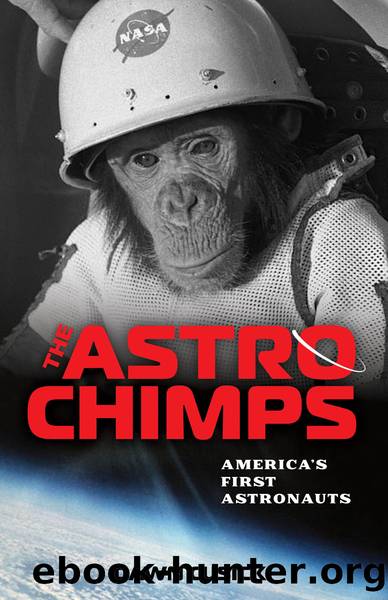The Astrochimps by Dawn Cusick

Author:Dawn Cusick
Language: eng
Format: epub
Publisher: Chicago Review Press
Published: 2024-02-15T00:00:00+00:00
To Chimp or Not to Chimp
Before America could beat the Soviets to the Moon, they had to get human astronauts into Earthâs orbit. And before they did that, NASA needed an astrochimp to test-drive the technology.
NASAâs leader, James Webb, warned overeager Americans: âIf we are to have our spectacular successes ⦠with even larger and ever more complex rockets, the early test flights, unmanned, of course, will involve spectacular failures.â
But America had lost patience with failures and delays. If NASA skipped the astrochimp trip, the United States could surpass the Soviets. Soon, a five-way battle circled the astrochimps. Astronauts, politicians, engineers, physicians, and everyday people had opinions.
The Mercury Seven astronauts campaigned to skip the chimp trip. They were well trained and ready to go. It still hurt that the Soviets beat them to space by twenty-three days. Hamâs First-American-in-Space title didnât help. The last thing the astronauts wanted was another chimpanzee stealing their thunder.
Was NASA too cautious? Or did it need an astrochimp to test-drive its rockets and space math? The answer depended on whom you asked. The engineers wanted technical details, while doctors and psychologists needed medical information.
Five weeks after the Sovietâs seventeen-orbit trip, NASA launched Mercury-Atlas 4 on a one-orbit trip around Earth. The flight had a mechanical astronaut on board, instead of a chimp or a human. For engineers, the âcanned manâ was âreally much better than a live animal,â said Max Faget. The pressurized box turned oxygen and carbon into CO2 and water, and released heat, just like humans and chimps do when breathing. The canned man also collected data.
Demands to cancel the astrochimp flight spiked like a fever. People implored NASA to launch John Glenn instead. Hadnât the Mercury-Atlas 4 mission proven America ready? The rocket didnât explode at liftoff. The spacecraft circled Earth and returned home, as planned. What else could NASA want?
Chief of the Mercury medical team, Lieutenant Colonel Stanley White, disagreed, arguing it would be âextremely hazardousâ to skip the chimpanzee flight. âThe MA-5 mission is more than a matter of just checking the spacecraft,â he reminded everyone. Simply, doctors and psychologists did not know how orbital space would affect humans.
Download
This site does not store any files on its server. We only index and link to content provided by other sites. Please contact the content providers to delete copyright contents if any and email us, we'll remove relevant links or contents immediately.
| Boats & Ships | Buses |
| Cars & Trucks | Construction Vehicles |
| Motorcycles | Planes & Aviation |
| Trains |
The Path Between the Seas by David McCullough(1188)
Brotherband 4: Slaves of Socorro by John Flanagan(1087)
The Sinking of the Bismarck by William L. Shirer(1084)
Ruby Redfort by Lauren Child(989)
Mr Gum and the Dancing Bear by Andy Stanton(983)
The Finest Hours by Michael J. Tougias(962)
S.O.S. Titanic by Eve Bunting(857)
02 by Diggers(803)
James in a Mess and Other Thomas the Tank Engine Stories by Rev. W. Awdry(755)
Fast Food Nation by Eric Schlosser(754)
4 Wizard and Glass by Stephen King(752)
Erika-San by Allen Say(749)
Tracked by Jenny Martin(748)
Women Aviators by Karen Bush Gibson(708)
Steam Train, Dream Train by Sherri Duskey Rinker(706)
Rev. W. Awdry_Thomas & Friends by Halloween in Anopha(698)
Trein 16:50 by A. Christie(686)
All the Wrong Questions 04 Why Is This Night Different from All Other Nights by Lemony Snicket(671)
Elite Infantry by Carl Bowen(633)
